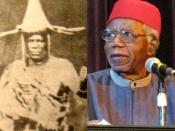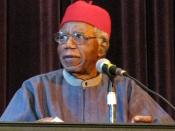Chinua Achebe's moving and highly personalized portrayal of the African way of life in "Things Fall Apart" served as a powerful tool for highlighting and criticizing the mistaken views the Western world had on African culture and society. Things Fall Apart is set in the late eighteenth century, and portrays the clash between Nigeria's white colonial government and the traditional culture of the indigenous Igbo people. Achebe's novel shatters the stereotypical European portraits of native Africans. He goes great lengths to portray the complex beliefs and traditions of Igbo culture prior to its contact with Europeans. He also provides varying depictions of the white man, such as the genuinely benevolent Mr. Brown, the overzealous Reverend Smith, and also the ruthless District Commissioner. In doing so he expertly evades the very mistake his European counterparts succumbed to, namely stereotyping the Africans as primitive and unrefined. Achebe does not enforce the Igbo culture on a European audience, but by portraying differing personalities, he brings credibility and support to his impassioned narration.
Mr. Brown represents one side of the multi-faceted coin that is Colonialism. Critics in favor of Colonialism point out the true mission of Colonialism as an attempt to 'civilize' the African world. Indeed, the famous Ruskin Bond referred to Colonialism as "the white man's burden". Mr. Brown is the torchbearer of such a mission to westernize the Igbo people. His character is a well-rounded portrait, matching bad personalities with good ones, bringing out a benevolent nature in him. Mr. Brown succeeds in converting a large number of the tribesmen because he listens to the villagers' stories, beliefs, and opinions. He also accepts the converts unconditionally. The derisive comments that Reverend Smith makes about Mr. Brown after the latter's departure illuminate another controversial aspect of colonialism- its intolerance for and lack...



Great review.
Infomation given was not so detail; howver, it gets to the point. Great choice of word use. Brought out the themes as well as what is special about "Things fall apart".
0 out of 0 people found this comment useful.